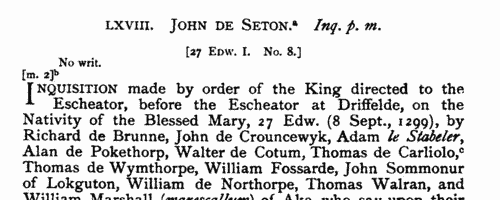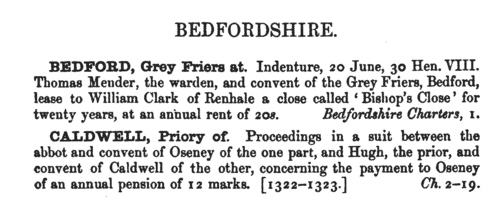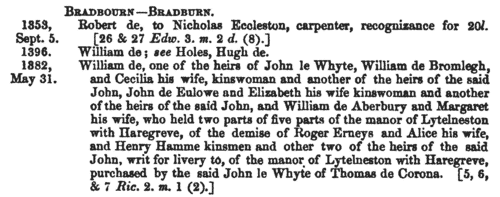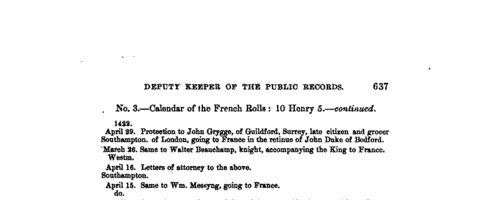John Surname Ancestry ResultsOur indexes 1000-1999 include entries for the spelling 'john'. In the period you have requested, we have the following 841 records (displaying 21 to 30): Single Surname Subscription | | | Buying all 841 results of this search individually would cost £4,806.00. But you can have free access to all 841 records for a year, to view, to save and print, for £100. Save £4,706.00. More... |
These sample scans are from the original record. You will get scans of the full pages or articles where the surname you searched for has been found. Your web browser may prevent the sample windows from opening; in this case please change your browser settings to allow pop-up windows from this site. Yorkshire Inquisitions
(1294-1303)
Inquisitions post mortem are inquiries as to the real estate and heir of each person holding in capite or in chief, i. e. directly, from the Crown, or whose estates had been escheated or were in ward. The age and relationship of the heir are usually recorded. Inquisitions ad quod damnum enquired as to any activities (including maladministration by local officials) that had resulted in any material loss to the Crown. Proofs of age are inquiries into the precise date of birth of an heir, usually involving local inhabitants recalling those circumstances which fixed that date in their mind. Yorkshire inquisitions for this period were edited by William Brown for the Yorkshire Archaeological Society, and printed in 1902. This index covers all names mentioned, including jurors, tenants, &c. The volume also includes two stray inquests, from 1245 and 1282.JOHN. Cost: £4.00.  | Sample scan, click to enlarge

| Norfolk Feet of Fines
(1196-1307)
Pedes Finium - law suits, or pretended suits, putting on record the ownership of land in Norfolk. These abstracts were prepared by Walter Rye.JOHN. Cost: £4.00.  | Sample scan, click to enlarge

| Oxfordshire Charters
(1330-1339)
A large accumulation of documents preserved in the Bodleian Library, Oxford, formerly constituted the antiquarian collections of Anthony a Wood, Roger Dodsworth, Ralph Thoresby, Thomas Martin of Palgrave, Thomas Tanner bishop of St Asaph, Dr Richard Rawlinson, Richard Furney archdeacon of Surrey, and Richard Gough. A calendar of these was prepared by William H. Turner and published in 1878 under the title 'Calendar of Charters and Rolls preserved in the Bodleian Library'. The word 'charters' is here used in a rather loose sense, including virtually any manuscript or copy of a manuscript, but the bulk of the contents consists of mediaeval deeds of conveyance. Turner's calendar deals with each briefly, naming the principal parties and the nature of the deed, but hardly ever lists the witnesses. Many of these charters were undated (dating of deeds did not become general until around 1350) or so damaged or defective ('mutilated' is Turner's usual description) as no longer to display a legible date. However, he contrived, from the style of the script and/or the nature of the contents, to estimate dates in such cases. The sample scan is from the start of the Bedfordshire list. JOHN. Cost: £4.00.  | Sample scan, click to enlarge

| Grantees of offices, commissions and pardons
(1350-1354)
The Patent Rolls are the Chancery enrolments of royal letters patent. Those for the 24th to the 27th years of the reign of king Edward III (25 January 1350 to 24 January 1354) were edited for the Public Record Office by R. F. Isaacson, and published in 1907. The main contents are royal commissions and grants; ratifications of ecclesiastical estates; writs of aid to royal servants and purveyors; and pardons. JOHN. Cost: £2.00.  | Sample scan, click to enlarge

| Payments by the English crown
(1370)
The Exitus or Issue Roll of the Exchequer, compiled by the Clerk of the Pell, recorded all issues or payments made by the English crown: presents of plate and jewellery to foreign nobility; household payments to officers and servants; wardrobe payments; alms; payments for the upkeep of royal palaces, manors, residences and chapels; repayments of loans to the king; payments to messengers and couriers; wages of mercenaries; the upkeep of the navy; ransoming of hostages; maintenance of castles, forts, garrisons and fortifications; salaries of judges and other officers of the courts of Chancery, Exchequer, King's Bench and Common Pleas; as well as a host of miscellaneous other items. This is a translation of the text of the roll for the 44th year of the reign of king Edward III, when Thomas de Brantingham, Bishop of Exeter, was Lord High Treasurer of England.
JOHN. Cost: £4.00.  | Sample scan, click to enlarge

| Inhabitants of Cheshire and North Wales
(1370-1379)
The county of Cheshire had palatine status, being in some measure independent of the rest of England: moreover, from the Statute of Wales of 1284, after king Edward I's subjugation of North Wales, until the union of England and Wales in 1536 to 1543, much of the administration of North Wales (county Flint in particular) was directed from Chester. When the Chester Recognizance Rolls were moved from Chester to the Public Record Office, they were placed among the Welsh Records. These rolls, so called because they do include recognizances (of debts &c.) among their contents, are in fact the Chancery Rolls of the palatinate, containing enrolments of charters, letters patent, commissions and other documents issued under the seal of the palatinate. Deeds and other evidences of a private nature were also enrolled on them. A calendar of the Recognizance Rolls from their commencement to the end of the reign of Henry IV was prepared by Peter Turner and included in the 36th Annual Report of the Deputy Keeper of the Public Records in 1875. We have now indexed this, dividing the enrolments into decades. This is the period from the 43rd year of king Edward III to the 3rd year of king Richard II.JOHN. Cost: £6.00.  | Sample scan, click to enlarge

| Inhabitants of Yorkshire: Claro wapentake
(1379)
The poll tax returns for this wapentake, the area around Aldborough, Boroughbridge, Knaresborough and Wetherby.JOHN. Cost: £6.00.  | Sample scan, click to enlarge

| Inhabitants of Cheshire and North Wales
(1390-1399)
The county of Cheshire had palatine status, being in some measure independent of the rest of England: moreover, from the Statute of Wales of 1284, after king Edward I's subjugation of North Wales, until the union of England and Wales in 1536 to 1543, much of the administration of North Wales (county Flint in particular) was directed from Chester. When the Chester Recognizance Rolls were moved from Chester to the Public Record Office, they were placed among the Welsh Records. These rolls, so called because they do include recognizances (of debts &c.) among their contents, are in fact the Chancery Rolls of the palatinate, containing enrolments of charters, letters patent, commissions and other documents issued under the seal of the palatinate. Deeds and other evidences of a private nature were also enrolled on them. A calendar of the Recognizance Rolls from their commencement to the end of the reign of Henry IV was prepared by Peter Turner and included in the 36th Annual Report of the Deputy Keeper of the Public Records in 1875. We have now indexed this, dividing the enrolments into decades. This is the period from the 13th year of king Richard II, who had intended to raise the earldom of Chester into a principality, to his overthrow by Henry IV.JOHN. Cost: £6.00.  | Sample scan, click to enlarge

| Inhabitants of Cheshire and North Wales
(1400-1409)
The county of Cheshire had palatine status, being in some measure independent of the rest of England: moreover, from the Statute of Wales of 1284, after king Edward I's subjugation of North Wales, until the union of England and Wales in 1536 to 1543, much of the administration of North Wales (county Flint in particular) was directed from Chester. When the Chester Recognizance Rolls were moved from Chester to the Public Record Office, they were placed among the Welsh Records. These rolls, so called because they do include recognizances (of debts &c.) among their contents, are in fact the Chancery Rolls of the palatinate, containing enrolments of charters, letters patent, commissions and other documents issued under the seal of the palatinate. Deeds and other evidences of a private nature were also enrolled on them. A calendar of the Recognizance Rolls from their commencement to the end of the reign of Henry IV was prepared by Peter Turner and included in the 36th Annual Report of the Deputy Keeper of the Public Records in 1875. We have now indexed this, dividing the enrolments into decades. This is the period from the 1st to the 11th years of king Henry IV.JOHN. Cost: £6.00.  | Sample scan, click to enlarge

| The English in France
(1413-1414)
King Henry V of England claimed the throne of France (and quartered the fleurs-de-lis of France with the lions of England on the royal standard) as had his predecessors since Edward III, as descendants of Philip IV of France. He married Katherine, youngest daughter of king Charles VI of France in 1420, and thereafter styled himself 'heir and regent of France'. The English had real power or influence in Brittany, Normandy, Flanders and Gascony, and actual possession of several coastal garrisons, in particular Calais, where the French inhabitants had been replaced by English. The English administration kept a series of records called the French Rolls. On these are recorded royal appointments and commissions in France; letters of protection and safe-conduct to soldiers, merchants, diplomats and pilgrims travelling to France from England and returning, and to foreign legations. There are also licences to merchants to export to the Continent, and to captains to transport pilgrims. This calendar of the French Roll for the 1st year of the reign of Henry V (21 March 1413 to 20 March 1414) was prepared by Alexander Charles Ewald and published in 1883.JOHN. Cost: £6.00.  | Sample scan, click to enlarge

|
Research your ancestry, family history, genealogy and one-name study by direct access to original records and archives indexed by surname.
|












